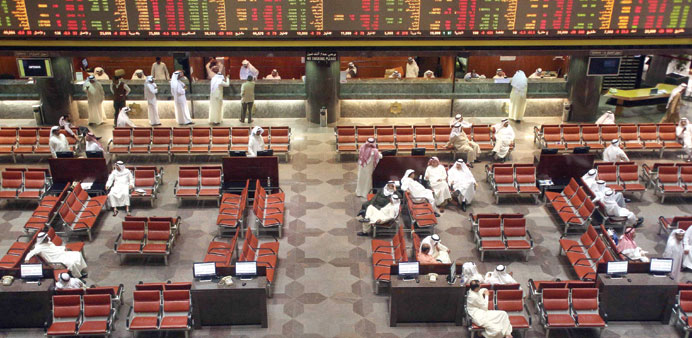Traders follow stock market activity at the Kuwait Stock Exchange yesterday. Markets in Kuwait and Oman dropped 2.4 and 2.6% respectively after Saudi Arabia and its allies in the region launched air strikes against Yemen’s Houthi militia.
Reuters/Dubai
Most Middle East stock markets fell yesterday after Saudi Arabia and its allies in the region launched air strikes against Yemen’s Houthi militia, but they came well off their lows late in the day as the initial panic subsided.
Saudi Arabia’s bourse, which is by far the region’s biggest market and closes later than others in the Gulf, finished higher.
Warplanes attacked the Yemeni capital Sanaa’s airport and its al Dulaimi military airbase yesterday after the Houthi militia and its army allies advanced towards the city of Aden a day earlier.
“Obviously it creates uncertainty and markets don’t like uncertainty,” said Shakeel Sarwar, head of asset management at Securities & Investment Co in Bahrain.
But he added: “If the situation remains contained and does not spread out, the markets will stabilise or even rebound” within a few days.
The main Saudi index closed 0.4% higher after falling as much as 4.2% earlier in the day and tumbling 5.0% in the previous session as preparations for military operations began.
Blue chips such as Saudi Arabian Mining Co (Ma’aden), which jumped 3.9%, and dairy firm Almarai, up 2.9%, were the main supports.
Almarai said yesterday it had received 250mn riyals ($66.7mn) from an insurer in compensation for a fire at one of its bakeries.
Property developer Dar Al Arkan climbed 1.1%, after plunging 15.5% in the two previous sessions in response to the government’s plan to tax undeveloped urban land.
The company’s chairman told Reuters on Wednesday that the new tax was unlikely to be applied to its huge land bank or push land prices down sharply. He also said Dar Al Arkan, which focuses on development of basic infrastructure on undeveloped land and the sale of such land, planned to diversify its business.
Dubai’s index closed 0.8% lower at after tumbling as much as 5.9% during the day. It ended at 3,407 points, above technical support at the January low of 3,358 points.
Abu Dhabi’s bourse was nearly flat.
Markets in Kuwait and Oman were the weakest, dropping 2.4 and 2.6% respectively. Both bourses close earlier in the day than other Gulf markets, and investors there had less time to calm down and reassess valuations.
Kuwait underperformed after Minister of Commerce and Industry Abdulmohsen al-Madaj resigned on Wednesday, becoming the second cabinet minister to quit this month after facing public criticism. His departure underlined political tensions that have slowed economic development of the country.
Egypt’s market fell 1.6% to a fresh two-month low of 9,053 points after the Cairo government said it was providing political and military support to the Saudi-led operation in Yemen.
Beltone Financial Holding was the biggest loser and tumbled 6.1% after reporting that its net profit shrank to 15.2mn Egyptian pounds ($2.0mn) in 2014 from 74.2mn pounds a year earlier.
Elsewhere, the Bahrain index lost 0.7% to 1,445 points.

